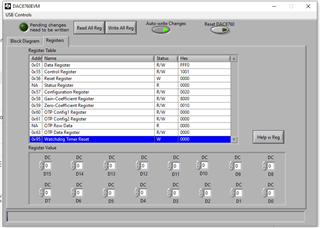Other Parts Discussed in Thread: DAC7760,
Hello,
I am currently using the DAC7760EVM as a sanity check for our propriety board. I am trying to get the DAC7760 to output 0 to 10V. When I enter the maximum code I get 9.986V. I was expecting that the output should be approximately 1 LSB less of the 5V reference voltage. What have I missed here? I have the following register settings

Many thanks in advance.

